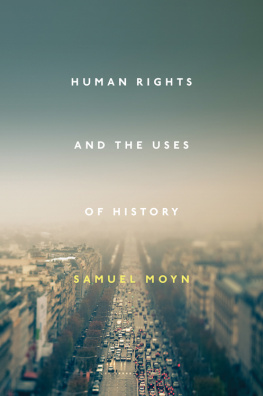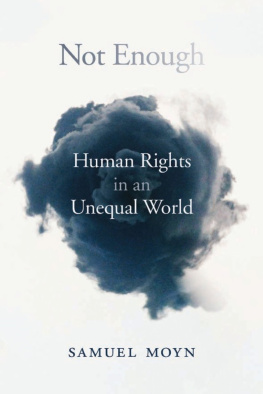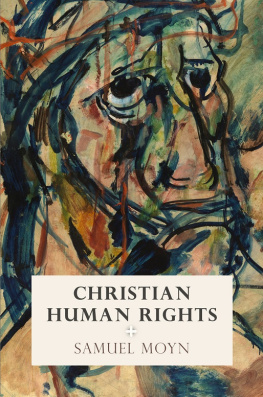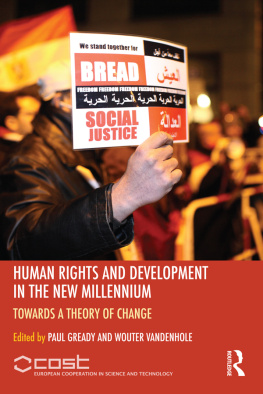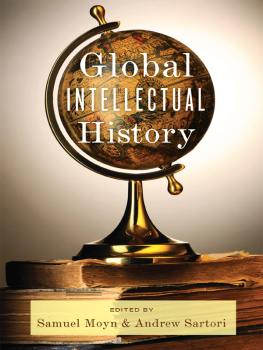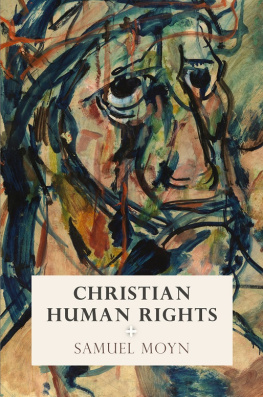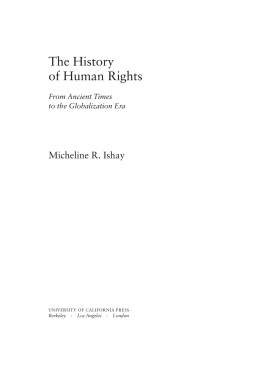HUMAN RIGHTS
AND THE USES
OF HISTORY

SAMUEL MOYN

First published by Verso 2014
Samuel Moyn 2014
All rights reserved
The moral rights of the author have been asserted
1 3 5 7 9 10 8 6 4 2
Verso
UK: 6 Meard Street, London W1F 0EG
US: 20 Jay Street, Suite 1010, Brooklyn, NY 11201
www.versobooks.com
Verso is the imprint of New Left Books
ISBN-13: 978-1-78168-263-0
eISBN-13: 978-1-78168-264-7 (US)
eISBN-13: 978-1-78168-652-2 (UK)
British Library Cataloguing in Publication Data
A catalogue record for this book is available from the British Library
Library of Congress Cataloging-in-Publication Data
A catalog record for this book is available from the Library of Congress
Typeset in Sabon by Hewer Text UK Ltd, Edinburgh, Scotland
Printed in the US by Maple Press
For Sara and her new family
If one would like to see our European morality for once as it looks from a distance, and if one would like to measure it against other moralities, past and future, then one has to proceed like a traveler who wants to know how high the towers in a town are: he leaves the city.
Friedrich Nietzsche
Spartam nactus es; hanc exorna (The city of Sparta is your portion; now embellish her) A man full of warm, speculative benevolence may wish his society otherwise constituted than he finds it; but a good patriot, and a true politician, always considers how he shall make the most of the existing materials There is something else than the mere alternative of absolute destruction, or unreformed existence.
Edmund Burke
CONTENTS
All history is contemporary history, Benedetto Croce said, and nowhere is this maxim truer than when it comes to the sudden rise of human rights history. A few short years ago, there was no such domain of historical inquiry. Now it is ubiquitous. It has verged on absorbing past themes that once stood on their own or served other purposes, like the meaning of the eighteenth-century Atlantic revolutions or the nineteenth-century campaigns against slavery. And it has sparked new and fascinating investigations into transformations of world governance, social movements, and international law.
And yet the rise of human rights history raises plenty of questions of its own. This sequence of essays presents my engagements with other attempts to stake out the coordinates of the domain. It was these inquiries into how others proposed to define a new field that originally drove me on the path to my own interpretation of where human rights came from, which appeared as The Last Utopiatowards a sequel on contemporary developments. The emphasis of these essays falls on distinguishing the abuses from the uses of history for thinking about the present and future of one of the most central notions and most illustrious political movements of our time.
Historians always engage in a double activity, beyond the accumulation of information that provides the necessary basis of their work. One is to demonstrate that facts about the past, even new facts, do not compel interpretations, which are always inflected by our own circumstances. And in particular, anxious about the threat of anachronism our present-day perspective necessarily breeds, historians show how other views, usually through selective evidence or misleading interpretation, betray the dead whom the writing of history is supposed to let live again on their own terms.
In this sense, history should be antiquarian. Insofar as they are not ideologues, historians think that, whatever the ethical value of the past, there is also an ethical command to respect its alterity. They feel the power of Jacob Burckhardts moral outrage at those who cast the annals as no more than a vast preparation for the way things are, and the way people think, right now: Each man regards all times as fulfilled in his own, and cannot see his own as one of many passing waves. Just as if the world and its history had existed merely for our sakes! Our ancestors were trying to be themselves rather than to anticipate somebody else. The past is not simply a mirror for our own self-regard.
And yet antiquarianism for its own sake is neither viable nor desirable. Too little understood is that arguments about historyincluding arguments insisting on The stress on the different futures the past left open only takes place in the mix of a broader and undoubtedly presentist activity, that either monumentalizes some current person, group, or project, or criticizes them in the name of something different. Whatever respect we owe the dead, history is still written byand meaningful tothe living. If so, abuses of the past call for uses in the name of a better future.
In the old days, when Burckhardts companion Friedrich Nietzsche originally offered the distinction between antiquarian, monumental, and critical history, it was the nation-state that historians chose to build up or tear down; in our day, it has frequently become human rights, along with their international laws and transnational servants. The main goal of this book is to insist on the critical impulse: human rights history should turn away from ransacking the past as if it provided good support for the astonishingly specific international movement of the last few decades. That movement comprises a politics for which history offers little validation because it is so new. If study of the past is useful at all in coming to terms with what happens today in the name of timeless and universal values, it suggests the reinvention of our movement in the name of a more just world. Human rights have so far done too little to bring that world about, which leaves a task beyond interpreting the past: crafting the future.
These chapters make particularly vivid the intersection of the writing of human rights history with Americas politics of liberal internationalism, which rose after the horrors of the Vietnam War in tandem with the search for a new geopolitical role for the country. Invented just before the end of the Cold War, liberal internationalism surged in the decade after, with massive consequences for history. The search for the origins of human rights is a by-product of the end of the Cold Warmore specifically, the temporary age between the bipolar standoff of the past and the multipolar struggle of the future. During what now seems a brief postCold War interregnum that will not last long, human rights looked to a great many like a concept that could bridge the distance between unipolarity and humanity itself. If there is a common thread in what follows, it is that liberal internationalism has both motivated and misled our inevitable conversation with the past about what to think and how to proceed nownot least because Americas unipolar moment seems set to wane. The history of human rights first emerged as something like the history of American morals, analogous to texts that Victorians once wrote to assess how far they had come and to stabilize the self-regard of their civilization even as the threats began to lurk that would soon engulf them in catastrophe and decline. Now it looks like the confused early epitaph of a giant entering senescence.
The evidence from the past for the centrality of human rights to the new liberal internationalism is hardly promising. The ancient past from the Greeks and the Bible on hardly provided plausible sources, but then it has always been easy to update the myth of Western civilization to suit momentary agendas. The Atlantic revolutions did not serve much better, notwithstanding President Jimmy Carters rousing assertion in his farewell address to the country: America did not invent human rights, he noted, introducing a theme Yet especially in the origins of America (not to mention France), rights had originally been a revolutionary conception, authorizing violence if necessary, and for the sake of national liberation. In the recent search for a usable past under the auspices of Americas liberal internationalism, however, the revolutionary origins of rights have been domesticated and the primarily statist and nationalist associations rights maintained for most of modern history were quietly dropped. The first chapter of this collection, on the book by Lynn Hunt on the revolutionary origins of human rights that has done most to define the field, pursues these troubling reinventions.

